Lead Gen Playbooks 2025: AI-Powered Strategies For Maximised Conversion
How AI, better data, and automated workflows turn outreach into predictable pipeline
Blogby JanAugust 16, 2025

Your cold email campaign just hit a 0.8% response rate, and your boss wants to know why you're burning through the marketing budget without generating qualified leads. Meanwhile, your competitor seems to be booking meetings left and right with prospects who should be responding to your messages.
The problem isn't your offer or your market - it's your approach. Lead gen playbooks have evolved dramatically in 2025, and teams still using 2022 strategies are getting crushed by competitors who've adopted AI-powered prospecting, advanced data enrichment, and systematic workflow automation.
According to recent industry research, 79% of B2B marketers are already using AI for lead generation, while 53% plan to increase their investment to improve campaign effectiveness. Companies that have adapted their lead gen playbooks to include AI-driven personalization are seeing significantly higher response rates compared to traditional mass email approaches.
Here's what's changed: Modern lead gen playbooks aren't just about sending more emails. They're about creating intelligent systems that identify high-intent prospects, enrich data automatically, personalize outreach at scale, and nurture relationships through multiple touchpoints. The teams winning in 2025 have playbooks that combine human insight with AI efficiency.
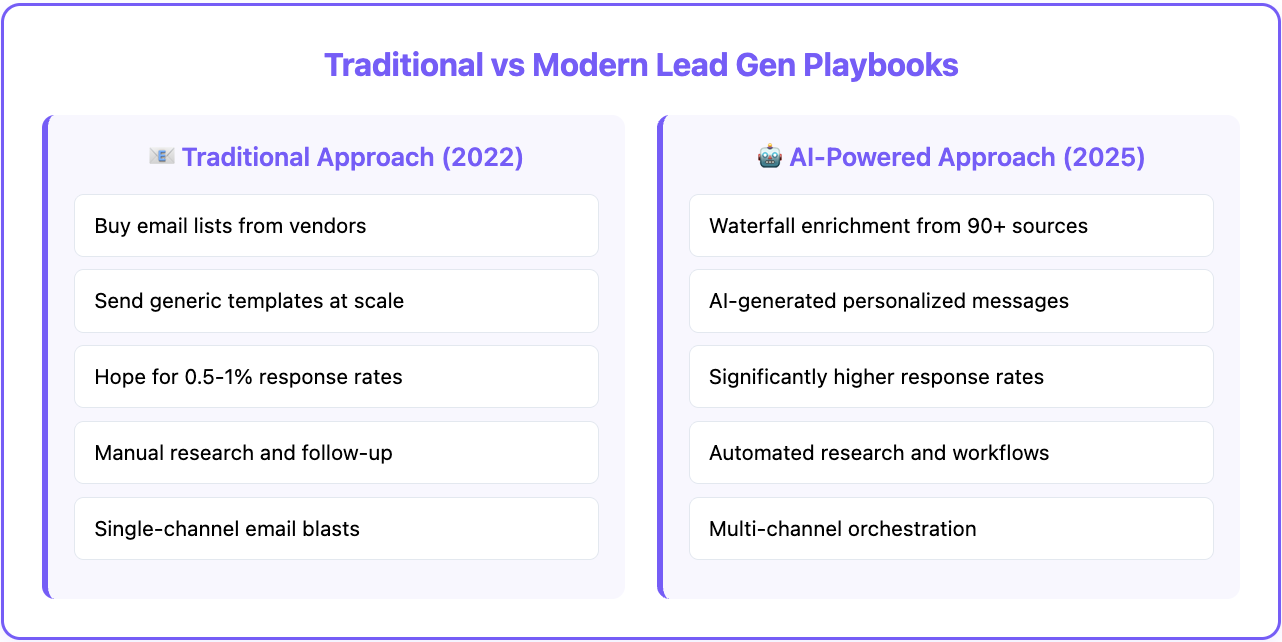
What Makes Modern Lead Gen Playbooks Different
Lead gen playbooks used to be simple: find email addresses, blast out templates, hope for replies. Today's winning playbooks operate like sophisticated machines that combine multiple data sources, AI personalization, and automated workflows to create consistent, predictable results.
Modern playbooks solve three critical problems that killed traditional approaches:
Data Quality Issues - Instead of working with incomplete prospect lists, today's playbooks use waterfall enrichment to gather comprehensive information from multiple sources before any outreach begins.
Generic Messaging at Scale - Rather than sending the same template to everyone, AI-powered playbooks generate personalized messages based on recent company news, technology usage, hiring patterns, and buying signals.
Manual Process Bottlenecks - Advanced playbooks automate research, enrichment, personalization, and follow-up sequences, allowing teams to focus on relationship building and closing instead of administrative tasks.
Modern Lead Generation Strategies
Why Traditional Approaches Stopped Working
The average executive receives 121 emails daily, and most sales development teams are still using approaches that worked when that number was half as high. Generic "Hey {{FirstName}}" emails get deleted instantly. Cold calling hit rates have dropped below 2%. LinkedIn connection requests with immediate pitches get ignored or reported.
Meanwhile, email service providers have implemented stricter sending limitations, and prospects have become incredibly sophisticated at identifying and filtering out generic sales outreach. The old playbook of buying a list and blasting emails simply doesn't work anymore.
Lead gen playbooks that succeed in 2025 acknowledge this reality and build strategies around providing genuine value, demonstrating relevant knowledge, and reaching prospects when they're actually in buying mode.
AI in Modern Prospecting
Artificial intelligence has fundamentally changed what's possible in lead generation. AI-powered lead gen playbooks can process thousands of data points about prospects and companies, identify buying signals in real-time, and craft personalized messages that sound like they came from a human who actually researched the prospect.
Tools like Databar.ai exemplify this evolution by providing access to 90+ data providers through waterfall enrichment technology in combination with AI agents for research. Instead of manually researching each prospect or settling for incomplete information from single sources, modern playbooks automatically gather comprehensive intelligence before any outreach begins.
This means your messages can reference specific technologies the prospect uses, recent company milestones, hiring patterns that indicate budget availability, and industry challenges that align perfectly with your solution.
Building Your AI-Powered Lead Gen Playbook
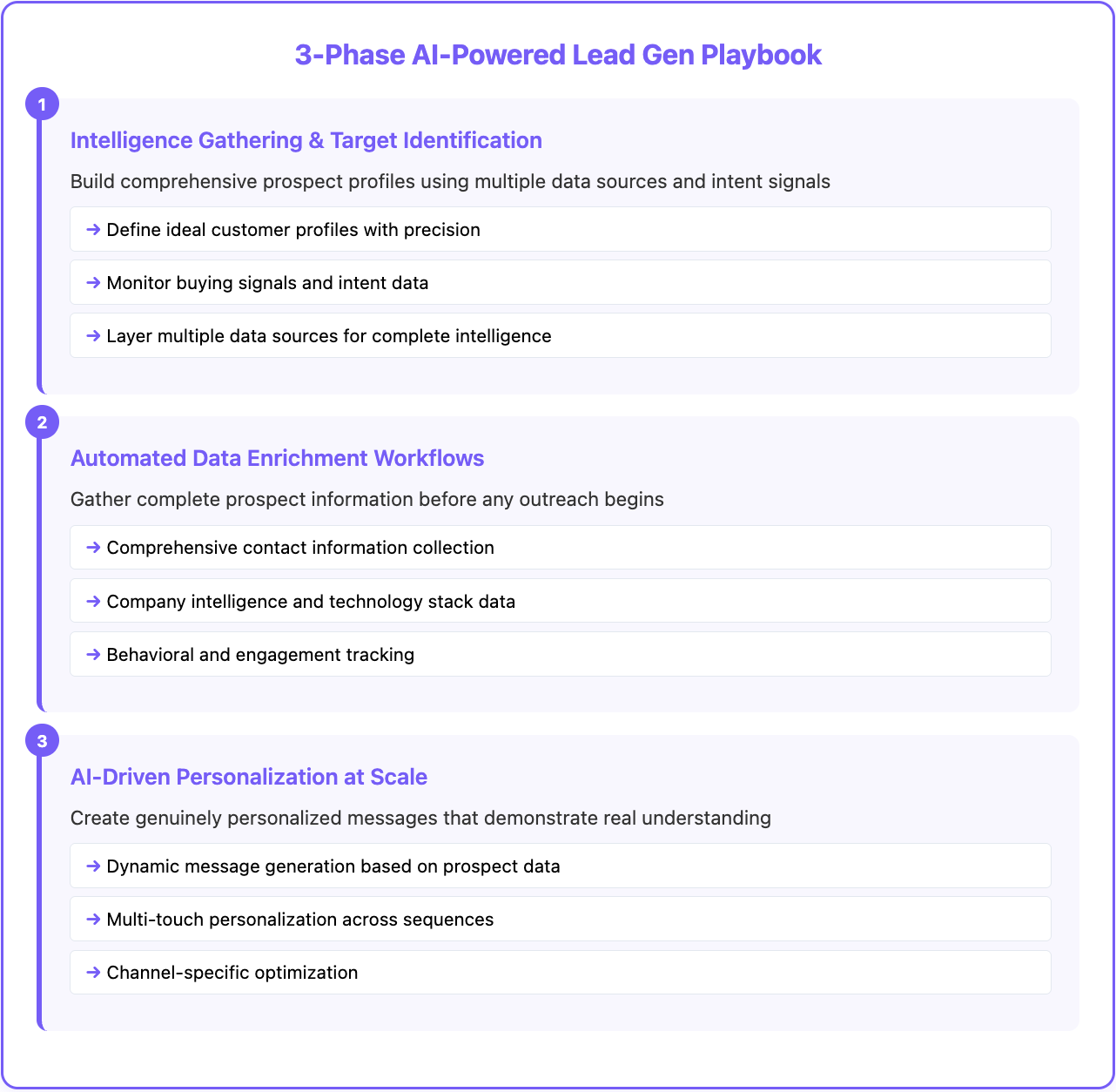
Phase 1: Intelligence Gathering and Target Identification
The foundation of any successful lead gen playbook starts with knowing exactly who you're targeting and why. This goes far beyond basic demographic information - modern playbooks identify prospects based on intent signals, technology usage, funding events, and behavioral patterns.
Define Your Ideal Customer Profile with Precision
Create detailed profiles that include not just company size and industry, but technology stack requirements, recent funding status, hiring patterns, and growth indicators. Companies growing rapidly often have budget and willingness to invest in new solutions.
Identify Buying Signals and Intent Data
Modern lead gen playbooks monitor multiple signals that indicate purchase intent: job postings for relevant roles, technology changes, funding announcements, expansion into new markets, and content engagement patterns.
Layer Multiple Data Sources
Instead of relying on single databases, effective playbooks combine information from sales intelligence platforms, social media monitoring, news tracking, and website visitor identification to build comprehensive prospect profiles.
Phase 2: Automated Data Enrichment Workflows
Once you've identified target accounts and contacts, the next phase involves gathering all available intelligence about these prospects before crafting any outreach. This is where waterfall enrichment becomes crucial.
Comprehensive Contact Information
Beyond basic email addresses, modern playbooks gather direct phone numbers, social media profiles, recent content they've published, and communication preferences. This enables multi-channel outreach that feels coordinated rather than scattered.
Company Intelligence Gathering
Effective lead gen playbooks automatically collect technology stack information, recent news and press releases, funding status, employee count changes, and competitive landscape details. This intelligence informs both messaging strategy and timing decisions.
Behavioral and Engagement Tracking
Advanced playbooks monitor prospect engagement with your content, website visits, social media interactions, and participation in industry events. This helps prioritize follow-up efforts and customize messaging based on demonstrated interest.
Phase 3: AI-Driven Personalization at Scale
The breakthrough in modern lead gen playbooks comes from using AI to create genuinely personalized messages at scale. This isn't about inserting a first name - it's about crafting messages that demonstrate real understanding of the prospect's situation.
Dynamic Message Generation
AI tools analyze prospect data and generate custom opening lines, value propositions, and call-to-action phrases based on specific company challenges, recent developments, and industry trends.
Multi-Touch Personalization
Instead of sending identical follow-up messages, advanced playbooks create unique content for each touchpoint, referencing different aspects of the prospect's business or recent company activities.
Channel-Specific Optimization
Modern playbooks adapt messaging style and content based on the communication channel - emails focus on business value, LinkedIn messages emphasize mutual connections, and phone scripts highlight urgent opportunities.
Workflow Automation
Building Scalable Process Systems
The most successful lead gen playbooks in 2025 treat prospecting like a manufacturing process - consistent inputs produce predictable outputs through systematized workflows.
Automated Research and Enrichment
Instead of manually researching each prospect, winning playbooks use tools like Databar.ai to automatically enrich prospect lists with comprehensive data from multiple sources. This ensures every outreach effort starts with complete information.
Intelligent Sequence Management
Advanced playbooks don't just send predetermined email sequences. They adapt follow-up timing and content based on prospect engagement, company events, and buying signal changes.
Multi-Channel Orchestration
Rather than treating email, phone, and social media as separate activities, modern playbooks coordinate touchpoints across channels to create cohesive prospect experiences.
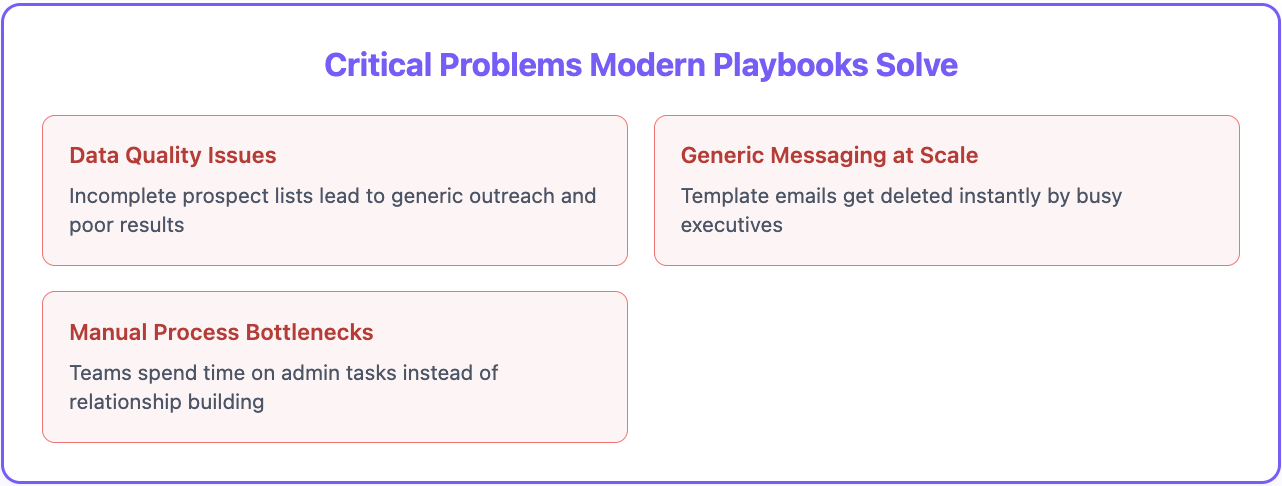
Quality Control and Optimization
Lead gen playbooks require continuous refinement based on performance data and market feedback. The best teams treat their playbooks as living documents that evolve based on results.
Response Rate Monitoring
Track not just email opens and clicks, but actual reply rates, meeting booking rates, and conversion quality. Optimize messaging and targeting based on which approaches generate the most qualified conversations.
A/B Testing Integration
Modern playbooks include systematic testing of subject lines, message content, sending times, and follow-up sequences. Small improvements compound over time into significant performance gains.
Deliverability Management
Advanced playbooks monitor sender reputation, domain health, and email placement rates. They include email warming processes and deliverability optimization to ensure messages reach intended recipients.
Industry-Specific Playbook Strategies
Technology and SaaS Companies
Technology sector lead gen playbooks focus heavily on technographic data and integration requirements. Prospects care about compatibility, security, and implementation complexity.
Successful technology playbooks reference specific tools the prospect currently uses, integration possibilities, and technical benefits rather than general business value. They often include technical content like integration guides or security documentation as value-add resources.
Professional Services and Consulting
Service-based lead gen playbooks emphasize expertise demonstration and social proof. Prospects want to see evidence of successful similar engagements and thought leadership.
These playbooks often include case studies from similar companies, industry-specific insights, and invitations to educational content rather than direct sales pitches.
Healthcare and Life Sciences
Healthcare lead gen playbooks require careful attention to compliance requirements and regulatory considerations. Messages must demonstrate understanding of industry challenges while respecting privacy restrictions.
Successful healthcare playbooks focus on clinical outcomes, regulatory compliance benefits, and industry-specific ROI metrics rather than general business advantages.
Advanced Tactics for Maximum Impact
Leveraging Intent Data and Buying Signals
Modern lead gen playbooks go beyond static demographic targeting to identify prospects actively researching solutions or experiencing events that create buying urgency.
Technology Change Monitoring
Track when target companies adopt new technologies, change vendors, or post job openings that suggest system changes. These events often indicate budget availability and decision-making processes.
Funding and Growth Signals
Monitor funding announcements, expansion plans, new office openings, and executive hires that suggest companies have resources to invest in new solutions.
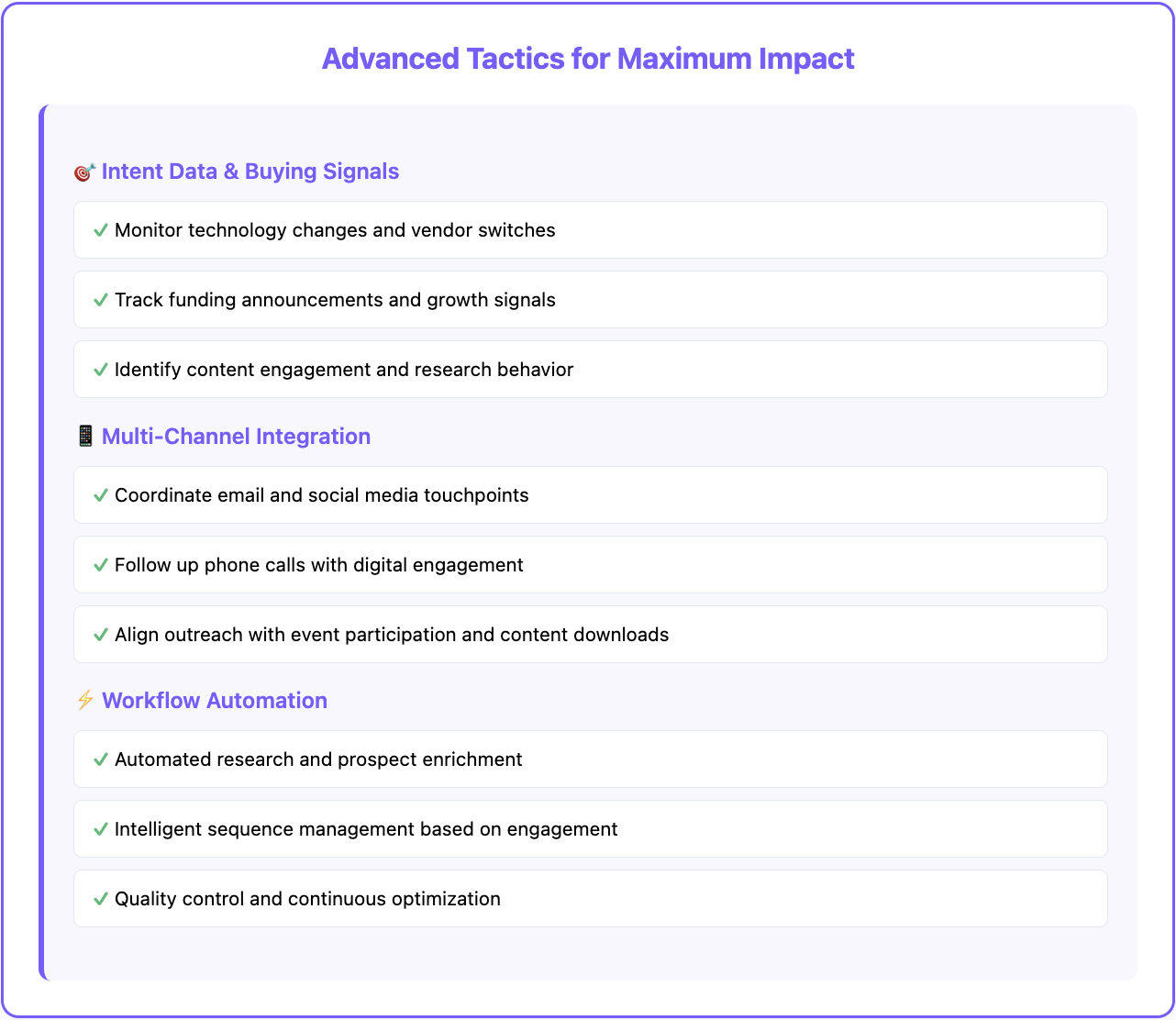
Content Engagement Tracking
Identify prospects engaging with competitor content, industry research, or solution-category discussions. This engagement indicates active interest and purchase consideration.
Multi-Channel Integration Strategies
The most effective lead gen playbooks coordinate touchpoints across multiple channels to create comprehensive prospect experiences that feel personal rather than automated.
Email and Social Media Coordination
Combine email outreach with LinkedIn engagement, content sharing, and social media interactions to build familiarity before direct outreach.
Phone and Digital Follow-Up
Use phone calls to follow up on email engagement or social media connections, referencing previous touchpoints to create continuity.
Event and Content Marketing Integration
Coordinate outreach timing with webinar attendance, content downloads, or event participation to capitalize on demonstrated interest.
How Databar.ai Powers Modern Lead Gen Playbooks
While building effective lead gen playbooks traditionally required multiple tools and complex integrations, platforms like Databar.ai streamline the entire process by combining data enrichment, AI personalization, and workflow automation in a single system.
Comprehensive Data Access
Instead of subscribing to multiple data providers or accepting incomplete information, Databar.ai provides access to 90+ data sources through waterfall enrichment. This means your playbook starts with complete prospect intelligence rather than guessing about company details or contact information.
Automated Workflow Creation
Rather than manually building complex enrichment and outreach sequences, Databar.ai offers proven workflow templates that automatically research prospects, enrich data, and trigger personalized outreach based on specific criteria.
AI-Powered Personalization
The platform's AI capabilities analyze prospect data and generate personalized message content that references specific company challenges, recent developments, and relevant business insights - all at scale.
Integration-Ready Outputs
Enriched data and personalized messages flow directly into your existing CRM, email platforms, and sales tools, ensuring your lead gen playbook works seamlessly with current processes.
This integrated approach eliminates the complexity of managing multiple tools while providing superior results compared to traditional point solutions.
Bottom Line
Effective lead gen playbooks in 2025 require a fundamental shift from volume-based tactics to intelligence-driven strategies that combine comprehensive data enrichment, AI-powered personalization, and systematic workflow automation.
The teams winning today have playbooks that treat prospecting like a science rather than an art. They use platforms like Databar.ai to access comprehensive prospect intelligence, generate personalized messaging at scale, and create systematic processes that produce predictable results.
The key is starting with complete prospect information, using AI to personalize outreach at scale, and building systematic workflows that can evolve based on performance data and market feedback.
Lead gen playbooks aren't just about generating more leads - they're about creating sustainable systems that consistently produce qualified opportunities while building genuine relationships with prospects who become long-term customers.
The choice is simple: either evolve your approach to match what's working in 2025, or watch competitors with better playbooks capture the opportunities you're missing.
Frequently Asked Questions
How do modern lead gen playbooks differ from traditional cold email campaigns?
Modern lead gen playbooks combine comprehensive data enrichment, AI-powered personalization, and multi-channel orchestration rather than relying on generic email templates. They focus on providing value and demonstrating relevant knowledge rather than pushing for immediate meetings.
How long does it take to see results from a new lead gen playbook?
Most teams see initial response rate improvements within 2-3 weeks of implementing better data enrichment and personalization. Significant pipeline impact typically becomes apparent within 6-8 weeks as qualified opportunities progress through sales cycles.
Can small teams implement sophisticated lead gen playbooks without dedicated resources?
Yes, platforms like Databar.ai enable small teams to access enterprise-level capabilities through automated workflows and integrated data sources. The key is choosing tools that provide comprehensive functionality without requiring extensive technical setup.
How do you balance automation with personal touch in lead gen playbooks?
The most effective approach uses automation for research, data enrichment, and initial personalization while preserving human insight for relationship building and complex conversations. AI handles administrative tasks so humans can focus on genuine engagement.
What metrics should teams track to optimize their lead gen playbooks?
Focus on reply rates, meeting booking rates, qualification conversion rates, and time-to-opportunity rather than just open rates or email volume. Quality metrics correlate better with revenue generation than pure activity metrics.
Related articles
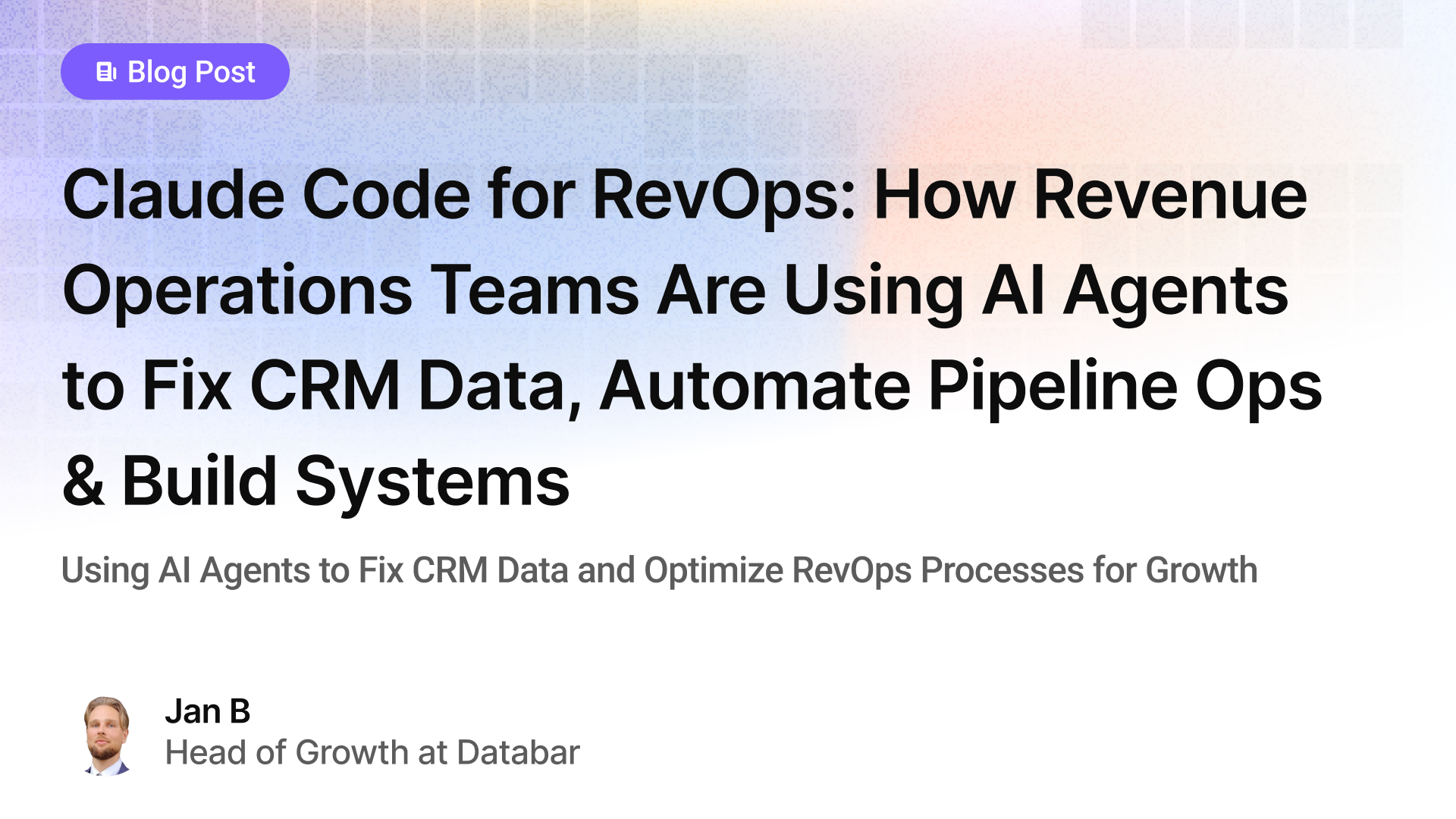
Claude Code for RevOps: How Revenue Operations Teams Are Using AI Agents to Fix CRM Data, Automate Pipeline Ops & Build Systems
Using AI Agents to Fix CRM Data and Streamline Revenue Operations for Scalable Growth
by Jan, February 24, 2026
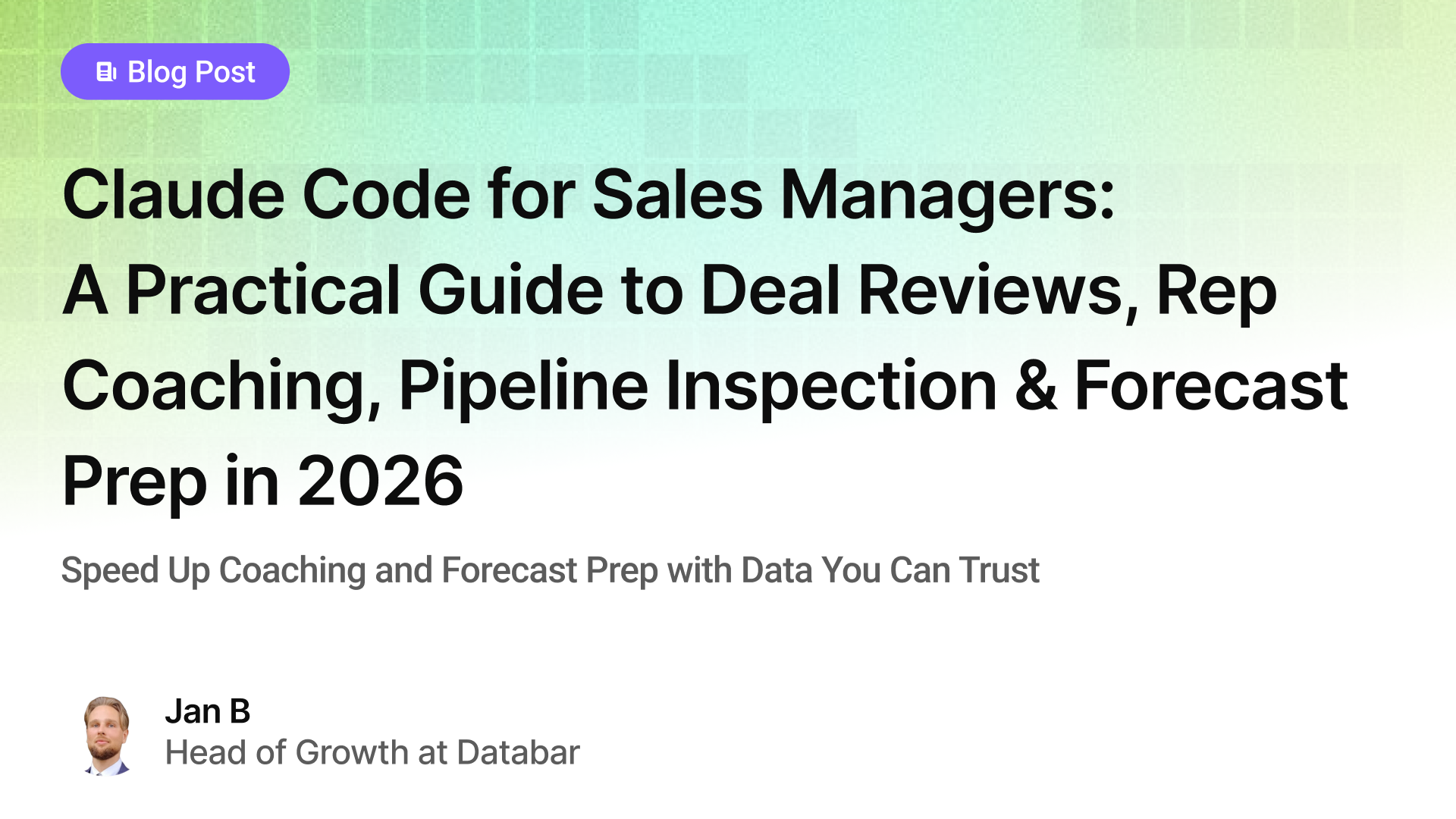
Claude Code for Sales Managers: A Practical Guide to Deal Reviews, Rep Coaching, Pipeline Inspection, and Forecast Prep in 2026
Speed Up Coaching and Forecast Prep with Data You Can Trust
by Jan, February 23, 2026
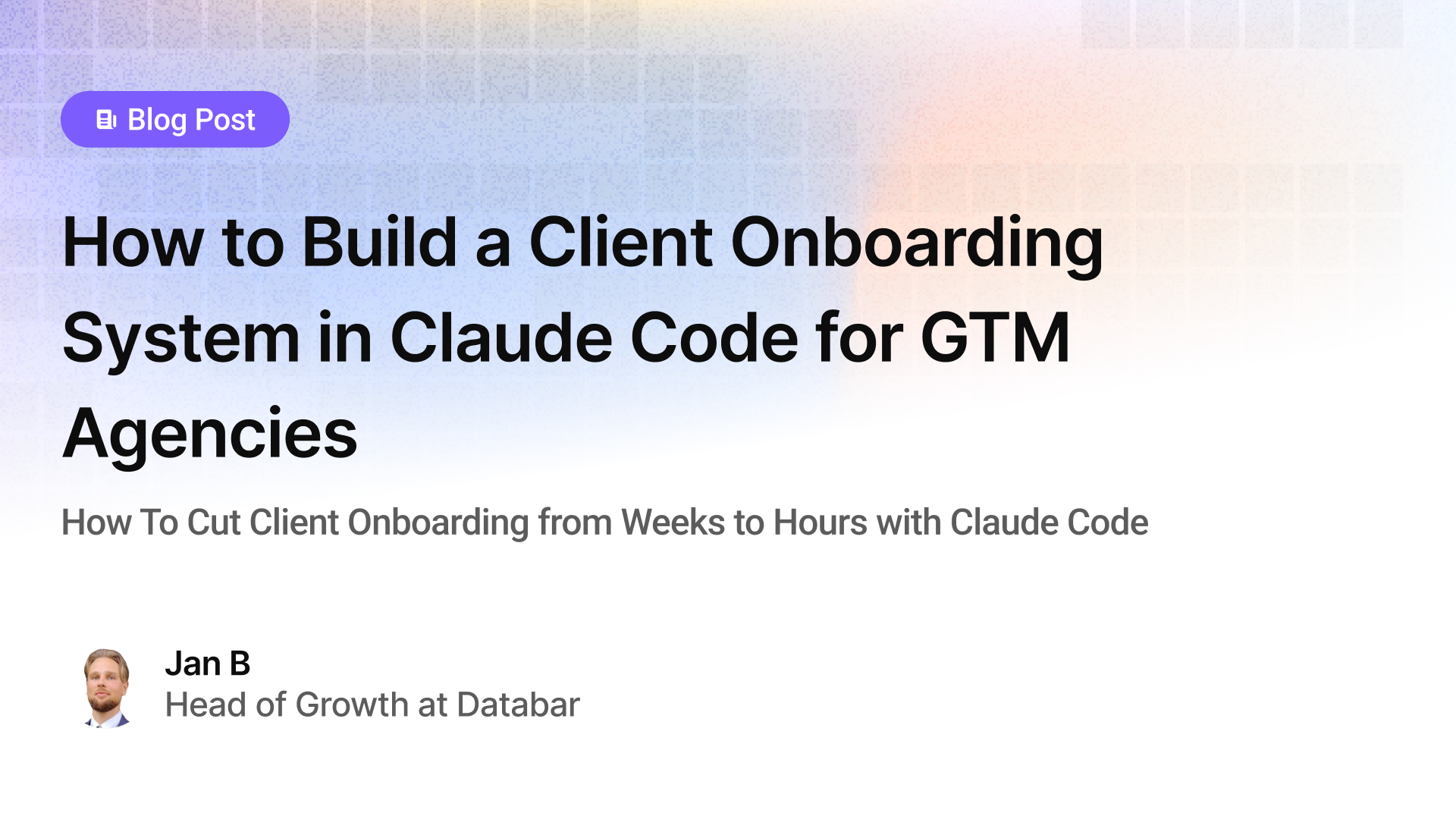
How to Build a Client Onboarding System in Claude Code for GTM Agencies
How To Cut Client Onboarding from Weeks to Hours with Claude Code
by Jan, February 22, 2026
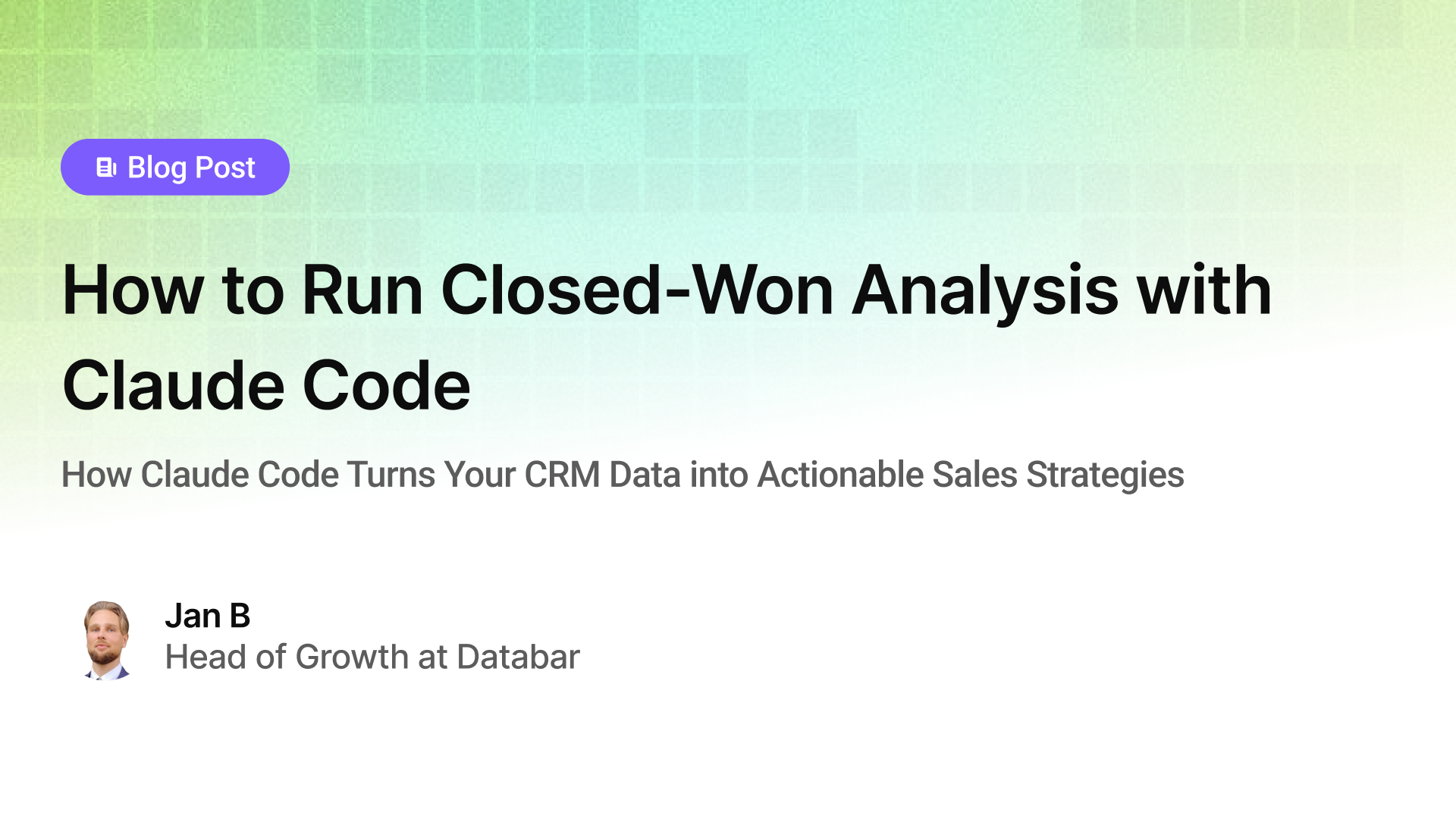
How to Run Closed-Won Analysis with Claude Code
How Claude Code Turns Your CRM Data into Actionable Sales Strategies
by Jan, February 21, 2026

